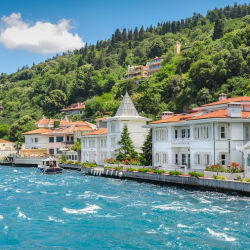Istanbul, a captivating blend of East and West, stands as Turkey's largest metropolis and one of the world's most dynamic cities. With its strategic location bridging Europe and Asia, Istanbul has long been a crossroads of cultures and commerce. Today, it continues to be a hub for global business and finance.
The city is home to numerous multinational corporations, foreign banks, and international brands, making it a thriving center for business activity. Its diverse districts, each with its unique character, offer a variety of business hubs and commercial centers. Whether you're seeking opportunities in finance, technology, or retail, Istanbul provides a fertile ground for business growth and innovation.
Istanbul, a dynamic metropolis, is home to a rapidly growing population. Officially, its population was recorded as 17 million at the beginning of 2024. However, recent estimates suggest that the city has surpassed 21 million inhabitants, making it larger than 177 nations worldwide.
This significant population growth is a relatively recent phenomenon, with the city's rapid expansion beginning in the 1950s, coinciding with Turkey's rapid industrialization. A mass migration from rural areas to Istanbul, seeking economic opportunities, has driven this growth. This trend continues today, shaping the city's ever-evolving urban landscape.
Economic Development in Istanbul
Istanbul's economic potential is enormous; it accounts for 38% of Turkey's entire industrial production and 40% of the taxes collected in the nation. Furthermore, Istanbul accounts for around 57% of national exports and 60% of national imports. The city boasts 30% of Turkey's total commercial enterprises, making the Istanbul Chamber of Commerce (ITO) and Istanbul Chamber of Industry (ISO) one of the world's largest trade chambers.
As a result, Istanbul draws a large number of multinational corporations, foreign banks, offices, stores, and brand names, among other things. In each of the city's districts, there are various business hubs with offices and bank branches. There are three main ports, four free trade zones, and two international airports. Istanbul is gaining a bigger proportion of international commerce every year for a variety of reasons, including its location as a natural bridge between East and West.
Turkey's Economic Capital: Istanbul
The 2018 Turkish cash and obligation situation struck Istanbul severely. As of August 2018, about 33% of office space in Turkey's economic metropolis of Istanbul was vacant, and office leasing prices across all segments had dropped significantly.
Istanbul has always been Turkey's "monetary capital," even after Ankara became the country's new political capital in 1923. During the 1980s, the city's explicit commercial sectors strengthened their position. The Istanbul Stock Exchange (ISE), established at the beginning of 1986, is Turkey's sole protection market, designed to provide exchanging values, right coupons, Government securities, Treasury bills, income-sharing endorsements, securities given by the Privatization Administration, and corporate securities.
In 1993, the ISE decided on gold market advancement, and in 1995, the Istanbul Gold Exchange was established, which completed the Turkish Central Bank's gold bullion imports limiting infrastructure and shifted it to the secret area people from the gold trade
Borsa Istanbul: A Hub of Turkish Finance
Borsa Istanbul (BIST), Turkey's primary stock exchange, is a dynamic platform that brings together stocks, bonds, derivatives, and commodities under one roof. Established in 2013, it emerged from the merger of the Istanbul Stock Exchange, the Istanbul Gold Exchange, and the Derivatives Exchange of Turkey. This consolidation aimed to create a more efficient and competitive financial market.
As one of the leading emerging market exchanges, Borsa Istanbul plays a vital role in Turkey's economic growth and development. It offers a wide range of investment opportunities, attracting both domestic and international investors. The exchange's diverse product offerings and state-of-the-art trading infrastructure have contributed to its increasing prominence on the global financial stage. Whether you're a seasoned investor or just starting your investment journey, Borsa Istanbul provides a platform to participate in Turkey's economic growth and potentially generate significant returns.
 Chinese
Chinese  Indonesian
Indonesian  Urdu
Urdu  Taiwanese
Taiwanese  Russian
Russian  Romanian
Romanian  Portuguese
Portuguese  Persian
Persian  Macedonian
Macedonian  Korean
Korean  Japanese
Japanese  Italian
Italian  Indian
Indian  Hungarian
Hungarian  Greek
Greek  German
German  Croatian
Croatian  Bulgarian
Bulgarian  Arabic
Arabic  French
French  Spanish
Spanish  English
English 



